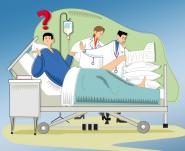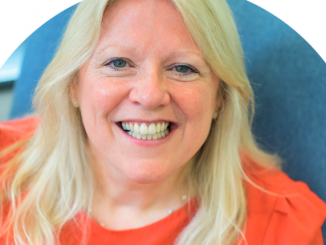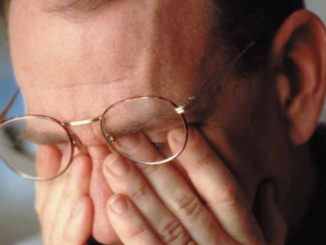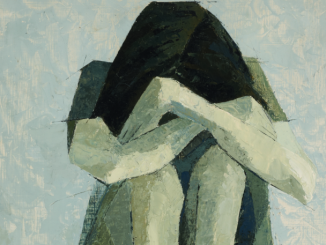How do we allow such behaviour among colleagues? asks the author, after experiencing what its like to feel vulnerable and in pain when your doctor doesnt seem to care.
This article was first published in The Oncologist vol. 19, no. 12, and is republished with permission. © 2014 AlphaMed Press doi:10.1634/theoncologist.2014-0387
 Empathy in medicine matters. I should know – I have been a practising oncologist for 35 years. But it was only when, in a matter of seconds, I went from doctor to patient that I grasped its true significance.
Empathy in medicine matters. I should know – I have been a practising oncologist for 35 years. But it was only when, in a matter of seconds, I went from doctor to patient that I grasped its true significance.
A hiking trail that I had taken for granted for years betrayed me one day. The stones on a steep path that felt solid beneath my feet suddenly shifted, and I slipped hard, slid fast, and fell off a cliff. My right foot landed on a rock slab, crushing my right ankle badly, with five fractures.
I was taken to the emergency room of the hospital where I worked. My orthopaedic colleague, Dr R, took me to surgery, but as a result of excessive and traumatic swelling of the joint, he could not repair my ankle. He explained that cutting through the oedematous muscles and tissues would impede healing and increase the chance of infection. He was only able to temporarily stabilise my fractures using an external fixator, for which metal-alloy rods were drilled through my heel bone below and the shinbone above and then fastened together by bolts and screws. He explained that the definitive surgery would take place only after the swelling was gone. “The next operation won’t be easy, though,” he warned me, “so I am referring you to an ankle orthopaedist, Dr M,” who I knew practised in a large medical centre in a city far from ours.
Seeing my alarm, Dr R softened his tone. “Just try to put up with pain for a while,” he said. “It’s not pancreatic cancer, you know. You will get better in time.”
I was not sure how to react to his words, which were meant to comfort me. It is true what he said – I was far luckier than any of my patients with pancreatic cancer, but that thought also brought some unpleasant memories of how some of my patients with pancreatic cancer had suffered. Would I suffer the same pain as my unfortunate patients, no matter how temporary? How capricious would my pain be? Doctors sometimes say things without thinking, and heaven knows how many times I may have said similar things myself in my own practice.
It was through my experience after sustaining this injury that I became aware of the behaviour of some clinicians – of some colleagues – that I still find incomprehensible. After their initial bursts of concern, they forgot to check on my welfare. We could tolerate the incompetence of our colleagues (as long as it is feasible), yet when it comes to those who are handicapped, there is a certain lack of empathy. Psychiatrist Howard Shapiro put it best: “Handicapped doctors are treated like drug addicts,” he said. “Get them out of sight.”
Although it was not easy, I assiduously followed Dr R’s advice to reduce my swelling: diligent wound care and the constant elevation of my foot on four to six pillows day and night. My oedema subsided, but the hardware attached to my foot was taxing and painful. I had access to narcotics, but they made things worse. I found that the codeine combinations dulled my brain and caused nausea and abdominal bloating.
Ultimately, I saw that Dr M, the ankle orthopaedist, was my best chance of freedom and rescue from the current situation, and I made the difficult trip to see him. As a fellow physician, I assumed he would surely empathise and understand my suffering.
To my shock, my belief and relief proved utterly wrong. He was unfeeling and appeared more interested in my fractures than in me. It was as if he had failed to notice that the joint was attached to a living being. He did not bother to touch me and was aloof with regard to the concerns I raised. I got the feeling that, to him, I was just a technical challenge and nothing more.
“It was as if he had failed to notice that the joint was attached to a living being”
“I have looked at your X-rays and scans,” he informed me, “and you have a hell of a lot of fractures.” He then scheduled my surgery. I told him I was an oncologist, unsure if he was aware of my profession. “That won’t change your surgery,” he said.
After I settled in a hospital bed, a young doctor came to my bedside. “I am an orthopaedic resident assisting Dr M today,” he said. He wanted to discuss one of my medications, an anticoagulant. “Why are you taking it?” he asked. “Did you have thrombophlebitis?” Then he was blunt: “Have you stopped it? We can’t do surgery if you haven’t. We can’t risk haemorrhage on the operating table.”
I was glad that he was careful about me before the operation. I assured him that I did not have thrombophlebitis and that my local orthopaedist gave me the drug in the hope of preventing it. I also told him that I had stopped it before coming in, as I was advised. Those were all the answers the young doctor was interested in, and he did not ask me any more questions about my health. He, too, didn’t even touch me. I could see that the young doctor was copying his mentor, Dr M, well. The former’s only concern seemed to be the anticoagulant that was noted in my record.
When the resident finished, a nurse gave me an injection. After that, I did not know what had happened until I woke up in the recovery room. I was confused at first and wondered why I was in this strange place. Then I noticed a familiar face – it was Ara, my wife. “You have been in the recovery unit for six hours waiting to get a room on the floor,” she said. “Surgery went fine.” I reflexively looked at my right leg. It had a white cast, and the hardware was gone.
I realized that Ara had been sitting by my side all through this time except when I was on the operating table. I felt a pang of guilt. A vivacious, beautiful woman who looked elegant had become haggard, her eyes sunken, face dry. What had I done to her? Why had I gone for that cursed hike?
Finally, I got a room at midnight. By then I had begun to experience pain again, but this pain was of another kind, gnawing and oppressive. As the muscles and tissues of my operated ankle swelled more and more because of the cutting, they were compressed by the hard cast surrounding them. It felt worse than when I had the fixator, which at least provided room for the swelling to expand. I wanted to forestall the pain’s ascending severity. I pressed the call button for the nurses to get an injection of morphine with an antinausea medication.
“Someone made a mistake in keying in your narcotics,” a nurse said. “I have called for a reorder.” Then there was more delay. “Only one pharmacist is on call at night,” she informed me. “He is swamped, and dispensing morphine has stringent rules.” She was genuinely sorry and offered me an oral codeine combination, which I accepted, but all it did was make me more miserable with nausea and abdominal bloating and little pain relief. Soon the pain got more severe, and I felt like a condemned prisoner without hope. By the time a nurse give me a narcotic injection, it was at about 3 a.m. – three hours after my request.
Following the injection of morphine, I became peaceful and went to sleep. I wished I had stayed that way, but I was startled awake at 6 a.m., after Dr M came in for his morning rounds. Without so much as a “good morning,” he held up an X-ray in front of me. “Here is a copy of your X-ray after surgery,” he said and then went on to quickly describe what he had done. “I have put in two plates and 14 screws to align the bones and some bone grafts to fill the gaps.”
My eyes were blurry from the light, and I was still hazy from anaesthesia, exhaustion, and narcotics. I could not take it all in at the time and only later understood what happened, with my wife’s help. After he finished telling me what he had done, he hurried to leave my room. Holding the doorknob on his way out, he said, “You can go home this morning.”
I hadn’t even had a chance to tell him about my ordeals at night. Ara, concerned about my pain and debility, pleaded my case: “He is too sick to travel, and we live far away.” Dr M did not appear moved by what she said and barely talked to her. “He can rest in a hotel as well as he can in the hospital,” he replied. “I will check him in the office in two days.”
“You can talk to the discharge planner,” he added, as he walked off.
I later discovered that he had admitted me as an outpatient case, and I had already spent the required night. One might read this story and see how unfair this discharge was and that I had the right to complain about it; however, when you are sick, you are vulnerable, doctor or not. You sign all the forms a hospital puts in front of you because you have to, and this absolves the hospital of any questionable conduct.
I wish I could say that my experience was unique in patient care, but it’s not. I think I would be correct in assuming that numerous patients would identify with me. Sadly, as I looked back at my practice, I saw that Dr M’s behaviour is partially explained by the silence of our colleagues. After all, neither I nor the other physicians had ever reproached another who had fallen short on bedside compassion.
True, the advances in specialisation and technology are saving lives or improving the quality of our lives, as they did mine. And my doctor was technically accomplished. Still, empathy is an integral part of care. Lack of empathy obviously compounds the distress of the patients, but what is not obvious is that it can have corrosive effects on the doctor’s mindset. Nine medical specialty groups have found that 45 procedures and tests currently performed by doctors have no demonstrable benefit or can be harmful to patients. Although some tests and treatments are done with good intentions, others, unfortunately, might be done for reasons that are less than altruistic. I believe that an empathic physician would try very hard not to subject his or her patients to tests or treatments with little benefit for them.
If we are to preserve our voice in healthcare, we clinicians must re-engage with our patients empathically while giving our best care possible. Otherwise, the public will become increasingly disenchanted. In time, they may put greater demands on us, demands that are less than empathetic to our complaints about medical practice.
Equally important, we must begin teaching our students and trainees medical humanities as early as we can. The humanities should not be optional but rather a standard part of the curriculum. I believe this is important because empathy can be nurtured. Ample stories in the literature illuminate the subject of medical education. An example is Anton Chekhov’s classic short story “Ward no. 6,” in which a doctor who was indifferent to the dehumanising treatments of his patients ends up, by quirk of fate, being a patient in his own hospital. He is horrified by the pain and indignities heaped on him, the same pain and indignities his patients suffered routinely for years under his watch. A terrible, agonising thought torments him: “How could it have happened that for more than twenty years he had not known it and had refused to know it?” Any medical student who is asked to contemplate this cannot help but get some sense of empathy for patients.
Fazlur Rahman is affiliated to the Department of Biology (Medical Ethics and Humanities), Angelo State University, San Angelo, Texas.





